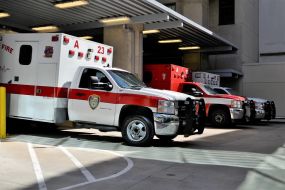How to Clean Up Trauma Scenes

Trauma cleanup is a complex process where professionals do everything by the book in order to ensure that a scene is fully cleaned after a crime or suicide. Trauma incidents are unlike anything most people have to deal with, as it often involves a loss of a life, whether a family member or personal contact, and they can be either accidental or intentional acts. Dealing with a trauma as a family, especially if it was a suicide can be devastating. Needing to also handle the scene of the incident after the fact can be equally as devastating. Trauma clean ups services are available to take this burden off of the family or friends.
1 – Isolating the Trauma Scene
Due to the nature of traumas, unknown fluids ranging from blood, bile, and any number of other excrements or chemicals, may be found at the scene. Isolating the area is key to dealing with a trauma scene. Without proper testing, there’s no way of knowing what pathogens could have been in someone’s body at their death, meaning any direct contact with their bodily fluids could be hazardous to someone’s health. You cannot allow just anybody into a trauma scene, they must be properly protected with PPE; always plan for the worst case scenario when it comes to chances of contagions.
2 – Calling in the Professionals
No matter the trauma, if it includes blood and bodily fluids, the cleanup process becomes messy, as everything within the scene must be considered a biohazard. The first professionals on the scene are generally going to be first responders, police, firefighters or paramedics, and once their job is complete, there is still a traumatic mess to deal with. It’s down to the homeowner, property owner, landlord, retailer, hotelier or local authorities to deal with the cleanup, and their first call should be to a trauma clean up team so that the process can start quickly, and with due respect to the deceased’s family or public. While trauma is something that is sudden, most commercial or industrial business owners should have a contingency plan in place, so they know who they are going to call immediately after an incident.
Cleanup should never be attempted without the help of professionals. Needlessly putting someone at risk attempting to clean up a trauma scene without proper training and equipment can lead to major health risks, and liability issues.
3 – Take a Sensitive Approach
Trauma scenes deal with the death of a person, and that means there is someone out there that is likely grieving, whether it is a family member, friend, or co-worker. Being sensitive to their feelings is important for any trauma clean up professional, otherwise they can make a painful situation even worse. Even witnessing a trauma scene of a stranger can be psychologically tolling on a person.
4 – Be Thorough with Any Trauma Cleanup
Trauma clean up professionals are trained to be very thorough when it comes to the clean up of a trauma scene. Cross contamination is a major risk, so they take all the proper precautions to ensure nothing dangerous is left behind after the cleaning is complete.
While surfaces may appear clean with just wiping, porous materials are very good at absorbing liquids, so professionals will take a pragmatic view as to whether something can actually be cleaned or must be thrown out. It is always best to be safe, rather than sorry when it comes to pathogen risks. Some things like rugs, carpeting, books and soft textiles may have to disposed of appropriately and replaced rather than cleaned.
5 – Disposal of Biohazards
Anything removed from a trauma clean up site should be considered a biohazard, even the tools and materials used. Trauma specialists are properly trained in the disposal of any biohazards from a trauma site and know what can or cannot be just flushed down a drain.
Trauma clean up can be a dangerous job, so leaving it to the professionals is a must. Trauma specialists have the training, equipment, and mental and physical fortitude necessary to handle the arduous task of cleaning up after an accidental, intentional, or personal trauma.
